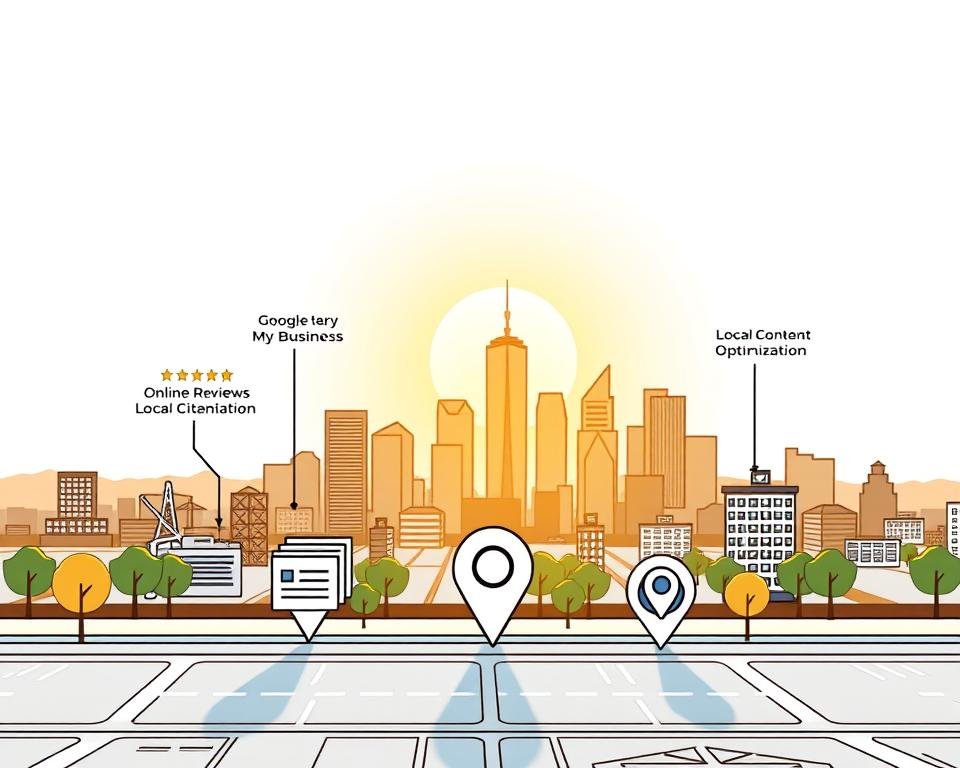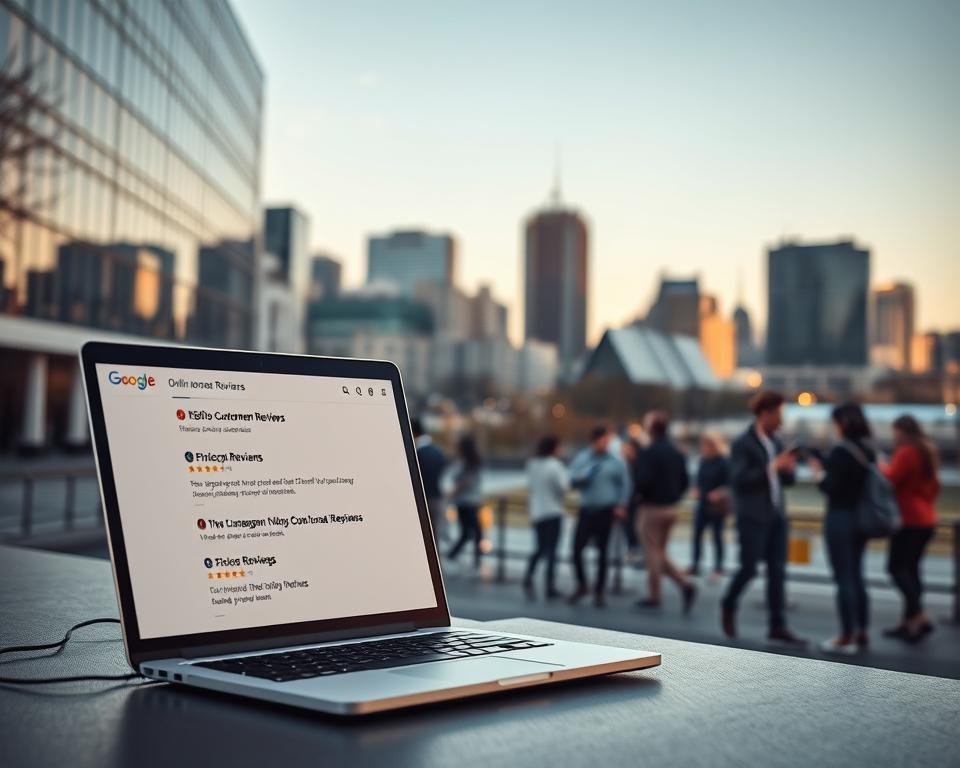As a business owner, knowing about local search optimization is key. It helps boost your online presence. In today’s world, having a strong online strategy is essential to reach local customers.
Local SEO is a way to make your business more visible in local searches. With more people using voice search and mobile devices, local SEO is more important than ever. It helps businesses stay ahead of the competition.
I will show you how this strategy can help your business. By improving your online presence for local searches, you can get more visibility. This leads to more foot traffic and higher sales.
Key Takeaways
- Local SEO is key for businesses to stay competitive online.
- It makes your business more visible in local searches.
- Local SEO brings in more foot traffic and boosts sales.
- It’s vital for businesses with a physical location.
- Investing in local SEO greatly improves your online presence.
Understanding Local SEO: A Definition
Local SEO makes a website more visible in local search results. It’s key for businesses in specific areas. This helps them attract local customers who search for their products or services online.
Local SEO connects businesses with their target audience in a personal way. It boosts online visibility, drives more foot traffic, and increases sales.
The Concept of Local SEO
Local SEO uses strategies to improve a website’s ranking in local search results. It optimizes content, structure, and coding for search engines. It also builds local citations and backlinks from relevant sources.
A big part of local SEO is optimizing for location-based searches. This means using location-specific keywords and creating content for local audiences. It also involves being listed in local directories and on Google My Business.
Key Differences Between Local and Traditional SEO
Traditional SEO aims for national or global visibility. Local SEO focuses on a specific area. It uses location-based keywords, local content, and local citations and backlinks.
Google My Business is vital in local SEO. Claiming and optimizing a Google My Business listing is essential. It gives local businesses a presence in Google’s local search results and maps.
Understanding local SEO and its differences from traditional SEO helps businesses. They can develop strategies to improve online visibility and attract more local customers.
Why Local SEO Matters for Businesses
For businesses with a physical presence, local SEO is key. It helps them reach customers who are looking for what they offer online. This is because more people are using the internet to find local products and services.
Increased Visibility in Local Searches
Local SEO makes a business more visible in local search results. When a business is optimized for local SEO, it shows up higher in searches. This means more people can find them online or in person.
Getting noticed online starts with being listed correctly in directories. Make sure your Name, Address, and Phone number (NAP) are the same everywhere.

Building Trust with Local Customers
Local SEO also helps build trust with local customers. Being at the top of search results makes a business seem more credible. People trust businesses that show up first in search results.
Here’s a table showing how local SEO affects trust:
| Trust Factor | Businesses with Local SEO | Businesses without Local SEO |
|---|---|---|
| Visibility in Local Searches | High | Low |
| Credibility | High | Low |
| Customer Reviews | Positive | Mixed |
Optimizing for local SEO boosts visibility and reputation. This can lead to more people visiting your business and buying from you.
How Local SEO Works
To succeed in local search, it’s key to know how local SEO works. It’s a strategy to make a business more visible online to local customers.
Google’s Local Algorithm Overview
Google’s local algorithm helps users find local search results. It looks at how close a business is, if it matches the search, and its online presence.
Key factors influencing Google’s local algorithm include:
- Business listing accuracy and consistency
- Relevance of the business to the search query
- Proximity of the business to the searcher’s location
- Online reviews and ratings
The Role of Local Keywords
Local keywords are vital for local search optimization. Using them in website content helps a business show up in local searches.
Best practices for using local keywords:
- Find the right local search terms through research
- Put local keywords in website content like titles and headings
- Use location-specific keywords in directories and citations
Knowing Google’s local algorithm and using local keywords well can boost a business’s online presence. This attracts more local customers.
Key Components of Local SEO
Mastering local SEO means knowing its key parts. Businesses need to focus on several important elements. These elements help them rank better in local search results.
Google My Business Optimization
Google My Business (GMB) optimization is very important. GMB is a free tool for managing your online presence on Google. It includes Google Maps and Search.
Optimizing your GMB listing means keeping your info up to date. This includes business hours, address, and contact details. A good GMB listing also has high-quality photos and a detailed description.

Importance of NAP Consistency
NAP consistency is another key part of local SEO. NAP stands for Name, Address, and Phone number. It’s important to have the same NAP everywhere online.
Having different NAPs can confuse search engines. This can hurt your local SEO. So, it’s important to check and fix any NAP issues to boost your local search visibility.
Local Citations and Their Impact
Local citations help make your business look good online. They show your business’s name, address, and phone number (NAP). These are key for local SEO, helping Google know you’re real and important locally.
Defining Local Citations
Local citations can be found on many places online. This includes local directories, websites, and social media. It’s important to keep your NAP the same everywhere for better local SEO.
Key elements of a local citation include:
- Business Name
- Address
- Phone Number
Where to Build Local Citations
Choosing the right places for local citations is key. Here are some top spots:
| Platform | Description | Benefits |
|---|---|---|
| Google My Business | A must for local businesses, helps manage your online presence. | Boosts visibility in Google search and maps. |
| Yelp | A big review site that affects your local SEO a lot. | Increases trust with customer reviews. |
| Bing Places | Helps show up in Bing search and maps. | Reaches more people than just Google. |

Understanding local citations can really help your business. Make sure your NAP is the same everywhere. Pick platforms that fit your business best.
Online Reviews and Their Influence
Online reviews are very important for local SEO. They help a business show up in local search results. Reviews are a key part of local SEO services.
The Importance of Customer Reviews
Customer reviews help build trust. They show a business is credible and reliable. Good reviews make a business more appealing to others.
Reviews also impact local search rankings. Search engines like Google look at reviews when ranking local businesses. It’s important for businesses to get their customers to review them.

Strategies for Encouraging Positive Feedback
To get more reviews, make it easy for customers. Provide links to review sites like Google My Business and Yelp. This makes it simple for them to leave feedback.
Also, engage with customers by answering their reviews. This shows you care about their opinions. It helps show you’re dedicated to great service.
- Provide excellent customer service to naturally encourage positive reviews.
- Follow up with customers after a purchase or service to ask for feedback.
- Utilize email marketing campaigns to request reviews from customers.
By using these strategies, businesses can boost their online reputation. This helps improve local SEO. It makes it easier for people to find and choose them.
Local Link Building Techniques
As a local SEO agency, I’ve seen how key local link building is. It helps businesses grow online and draw in more local customers.
Local link building means getting links from local sites, businesses, and directories. It’s vital for boosting a website’s authority and local search visibility.
What is Local Link Building?
Local link building is about getting links from sites that matter locally. These links tell search engines a business is part of the local community. This helps it rank better in local searches.
Local link building boosts a business’s credibility and online presence. Getting links from trusted local sources helps with local SEO.
Effective Ways to Acquire Local Links
Businesses can use several methods to get quality local links:
- Partner with local businesses and organizations for content or events.
- Get listed in local directories and citations.
- Join local sponsorships and charity events.
- Create content that matters to the local community.
| Local Link Building Strategy | Description | Benefits |
|---|---|---|
| Local Partnerships | Partner with local businesses for content or events. | Boosts local credibility, improves SEO. |
| Local Directories | Get listed in top local directories and citations. | Increases online visibility, better local search rankings. |
| Local Sponsorships | Join local sponsorships and charity events. | Builds a positive brand image, gets local links. |
Using these local link building methods can greatly help businesses. They can attract more local customers and improve their online presence.

Mobile SEO in a Local Context
Most local searches happen on mobile devices now. This makes mobile SEO key. It’s a big part of a business’s online plan.
The Rise of Mobile Search
Smartphones have made mobile search very common. People use them to find local shops and services. Having a good mobile site is very important.
Key statistics highlighting the rise of mobile search include:
- A lot of local searches are done on mobiles.
- Mobiles are the main way to find local businesses.
- More people will use mobiles for local searches in the future.
Optimizing for Mobile Users
Businesses need to make their sites work well on mobiles. They should load fast and be easy to use. A responsive design is best.
Best practices for optimizing for mobile users include:
- Make sure your site works on all devices.
- Make your site load quickly.
- Keep your site simple for mobile users.

Understanding mobile SEO is key. By optimizing for mobiles, businesses can get more seen in local searches. This brings in more customers.
The Role of Social Media in Local SEO
Social media is key for businesses wanting to be seen online. It helps them show up in local searches. By using social media, businesses can connect with their community and get more customers.
Building Your Online Community
Creating a strong social media presence is important. This means being active on sites like Facebook, Twitter, and Instagram. Here’s how:
- Make content that speaks to your local audience.
- Use local keywords and hashtags to get noticed.
- Talk to your followers by answering comments and messages.
This way, businesses can build a loyal group of supporters. They will help spread the word about what you offer.

Engaging with Local Customers
It’s vital to connect with local customers to build trust. Social media is a great place to do this. Here’s how:
- Share news and events that matter to your audience.
- Give special deals and discounts to your followers.
- Answer customer questions and concerns quickly.
By talking to local customers, businesses can earn a good reputation. This makes people more likely to recommend them.
To get the most out of local SEO, businesses need a strong social media presence. Combining local SEO with social media marketing boosts visibility. It drives more website traffic and increases sales.
Measuring the Success of Local SEO
Measuring local SEO success involves looking at specific metrics and using the right tools. Businesses need to track important indicators to see how well their local SEO is working. They should then adjust their strategy based on this data.
Key Metrics to Track
Here are the key metrics for measuring local SEO success:
- Local search rankings: Keep an eye on your site’s spot in local search results.
- Website traffic: Check how many local search visitors come to your site.
- Conversion rates: Watch how many leads or sales come from local searches.
- Online reviews: Look at the number and quality of reviews on Google My Business.
- Local citation consistency: Make sure your business’s info is the same everywhere online.
Tools for Local SEO Analytics
Here are some tools to track these metrics:
- Google Analytics: Gives insights into website traffic and more.
- Google Search Console: Shows data on search rankings and clicks.
- Google My Business Insights: Offers info on local search visibility and reviews.
- Local SEO tools like Moz Local, Ahrefs, or SEMrush: Help track citations, reviews, and competitors.
By tracking these metrics and using the right tools, businesses can see how well their local SEO is doing. They can then make smart choices to boost their online presence.
Future Trends in Local SEO
Local SEO is changing fast, thanks to new tech and how people shop. Businesses are getting better at making their sites easy to find online. New trends are coming that will change how we rank in local searches.
Voice Search Impact
Voice search is changing how we find local businesses. With virtual assistants getting popular, it’s key to optimize for voice. Use natural speech and long-tail keywords to match how we talk, not type.
This helps businesses show up more in local searches.
Post-Pandemic Local SEO Insights
The pandemic has made people search online more for local stuff. Businesses need to update their SEO to keep up. Make sure your listings are current and use online reviews.
Create content that speaks to your local community. This way, you can boost your local SEO and stay ahead.
